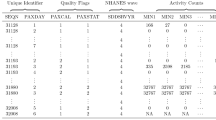Abstract
Activity inference based on object use has received considerable recent attention. Such inference requires statistical models that map activities to the objects used in performing them. Proposed techniques for constructing these models (hand definition, learning from data, and web extraction) all share the problem of model incompleteness: it is difficult to either manually or automatically identify all the possible objects that may be used to perform an activity, or to accurately calculate the probability with which they will be used. In this paper, we show how to use auxiliary information, called an ontology, about the functional similarities between objects to mitigate the problem of model incompleteness. We show how to extract a large, relevant ontology automatically from WordNet, an online lexical reference system for the English language. We adapt a statistical smoothing technique, called shrinkage, to apply this similarity information to counter the incompleteness of our models. Our results highlight two advantages of performing shrinkage. First, overall activity recognition accuracy improves by 15.11% by including the ontology to re-estimate the parameters of models that are automatically mined from the web. Shrinkage can therefore serve as a technique for making web-mined activity models more attractive. Second, smoothing yields an increased recognition accuracy when objects not present in the incomplete models are used while performing an activity. When we replace 100% of the objects with other objects that are functionally similar, we get an accuracy drop of only 33% when using shrinkage as opposed to 91.66% (equivalent to random guessing) without shrinkage. If training data is available, shrinkage further improves classification accuracy.
Preview
Unable to display preview. Download preview PDF.
Similar content being viewed by others
References
Perkowitz, M., Philipose, M., Patterson, D.J., Fishkin, K.: Mining Models of Human Activities from the Web. In: Proceedings of The Thirteenth International World Wide Web Conference (WWW 2004), New York, USA (2004)
Fishkin, K., Philipose, M., Rea, A.: Hands-On RFID: Wireless Wearables for Detecting use of Objects. In: Proceedings of the Ninth Annual IEEE International Symposium on Wearable Computers (ISWC 2005), Osaka, Japan (2005)
Feldman, A., Munguia-Tapia, E., Sadi, S., Maes, P., Schmandt, C.: ReachMedia: On-the-move Interaction with Everyday Objects. In: Proceedings of the Ninth Annual IEEE International Simposium on Wereable Computers (ISWC 2005), Osaka, Japan (2005)
Tapia, E.M., Intille, S.S., Lopez, L., Larson, K.: The Design of a Portable Kit of Wireless Sensors for Naturalistic Data Collection. In: Fishkin, K.P., Schiele, B., Nixon, P., Quigley, A. (eds.) PERVASIVE 2006. LNCS, vol. 3968, pp. 117–134. Springer, Heidelberg (2006)
Munguia-Tapia, E., Marmasse, N., Intille, S.S., Larson, K.: MITes: Wireless Portable Sensors for Studying Behavior. In: Proceedings of Extended Abstracts Ubicomp 2004: Ubiquitous Computing, Vienna, Austria (2004)
Wyatt, D., Philipose, M., Choudhury, T.: Unsupervised Activity Recognition Using Automatically Mined Common Sense. In: The Twentieth National Conference on Artificial Intelligence (AAAI 2005), Pittsburgh, Pennsylvania (2005)
Munguia-Tapia, E., Choudhury, T., Philipose, M., Wyatt, D.: Using Automatically Mined Object Relationships and Common Sense for Unsupervised Activity Recognition, Technical Report IRS-TR-05-014, Intel Research Seattle, Seattle, WA (May 2005)
Lester, J., Choudhury, T., Kern, N., Borriello, G., Hannaford, B.: A Hybrid Discriminative/Generative Approach for Modeling Human Activities. In: Proceedings of the International Joint Conference on Artificial Intelligence, IJCAI 2005 (2005)
Munguia-Tapia, E., Intille, S.S., Larson, K.: Activity Recognition in the Home Setting Using Simple and Ubiquitous Sensors. In: Ganzinger, H. (ed.) ESOP 1988. LNCS, vol. 300, pp. 158–175. Springer, Heidelberg (1988)
Patterson, D., Fox, D., Kautz, H., Philipose, M.: Fine-Grained Activity Recognition by Aggregating Abstract Object Usage. In: Proceedings of The Ninth Annual IEEE International Symposium on Wearable Computers (ISWC 2005), Osaka, Japan (2005)
McCallum, A., Rosenfeld, R., Mitchell, T., Ng, A.: Improving Text Classification by Shrinkage in a Hierarchy of Classes. In: Shavlik, J.W. (ed.) Proceedings of the 15th International Conference on Machine Learning (ICML 1998), pp. 359–367. Morgan Kaufmann Publishers, San Francisco (1998)
Freitag, D., McCallum, A.K.: Information Extraction with HMMs and Shrinkage. In: Proceedings of the AAAI 1999 Workshop on Machine Learning for Information Extraction (1999)
Anderson, C.R., Domingos, P., Weld, D.: Relational Markov Models and their Application to Adaptive Web Navigation. In: Proceedings of the 8th ACM SIGKDD International Conference on Knowledge Discovery and Data Mining, pp. 143–152 (2002)
Gu, T., Pung, H.K., Zhang, D.Q.: A Service-oriented Middleware for Building Context-aware Services. Journal of Network and Computer Applications (JNCA 2005) 28, 1–18 (2005)
Miller, G.A., Beckwith, R., Fellbaum, C., Gross, D., Miller, K.: Introduction to WordNet: An On-line Lexical Database (1993)
Stein, C.: Inadmissibility of the Usual Estimator for the Mean of a Multivariate Normal Distribution. In: Proceedings of the Third Berkeley Symposium on Mathematical Statistics and Probability, pp. 197–206. University of California Press (1955)
Author information
Authors and Affiliations
Editor information
Editors and Affiliations
Rights and permissions
Copyright information
© 2006 Springer-Verlag Berlin Heidelberg
About this paper
Cite this paper
Tapia, E.M., Choudhury, T., Philipose, M. (2006). Building Reliable Activity Models Using Hierarchical Shrinkage and Mined Ontology. In: Fishkin, K.P., Schiele, B., Nixon, P., Quigley, A. (eds) Pervasive Computing. Pervasive 2006. Lecture Notes in Computer Science, vol 3968. Springer, Berlin, Heidelberg. https://doi.org/10.1007/11748625_2
Download citation
DOI: https://doi.org/10.1007/11748625_2
Publisher Name: Springer, Berlin, Heidelberg
Print ISBN: 978-3-540-33894-9
Online ISBN: 978-3-540-33895-6
eBook Packages: Computer ScienceComputer Science (R0)




